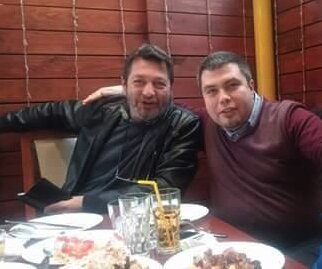
How Australia hides Nazi collaborators in plain sight
Nazis are alive and well in Australia, so much so that they are welcome to march in Australia’s famous ANZAC Day parade, which is supposed to commemorate the Allies. Someone in the Australian government it seems didn’t get the memo about the Serbian Chetniks and their near 4-year collaboration with both the Italian Fascists and German Nazis. Below is just a snippet of what can be easily found within minutes of searching both online and at any local or regional library.

Slovenia attempts to rewrite its wartime pro-Nazi history
It emerged in January that an unnamed grandchild of the country’s leading wartime pro-Nazi, the notoriously anti-Semitic General Leon Rupnik (pictured above left, with SS-General Erwin Rösener, right), had succeeded in persuading the country’s Supreme Court to annul the death sentence imposed on him in 1946. It did this on the ground that the military tribunal which tried him had been procedurally inadequate. In theory, the invalidated verdict could had led to a retrial in a lower court. There was a catch: the retrial would have required his presence in court, despite the fact he had been shot 73 years earlier.

Why does Australia continue to honour Balkan Nazis?
While Australia’s 2013-2015 Royal Commission into child sex abuse uncovered decades of sordid abuse and institutional cover-ups by the Catholic and other Churches, the RSL and its 170,000 members to this day dodge questions as to why the veteran’s body continues to allow Nazi collaborators to celebrate the country’s official war veterans day - April 25 or ANZAC Day, by letting them march alongside legitimate Australian and other Allied veterans.

Fatherland or like father like son?
Mr Momir Maricic, a leading public prosecutor and the father of Macedonia’s new Justice Minister , Bojan Maricic, has a fascination with Adolf Hitler memorabilia and has also refused to condemn the WWII Albanian Nazi collaborator statues built in Macedonia by Albanian extremist Nevzat Bejta.

Betrayal: RSL backs Nazi-aligned Serbian Chetniks
Because of his collaboration and other war crimes, Draza Mihajlovic was executed by Yugoslavia in March 1946. In fact, Chetnik collaboration became so widespread that after the Tehran Conference of 1943, the Allies finally broke off all ties with the Chetniks, eventually even forcing their own political head, King Peter II Karadordjevic to publicly disown them by September 1944 and throw his lot in with Tito’s Communist Partisans.

Bulgarian neo-Nazis march in honour of WWII general
Hundreds of neo-Nazis held a rally in Bulgaria’s capital Saturday commemorating a Nazi-allied Bulgarian general, after efforts to ban the march failed.The Sofia demonstration, known as the Lukov March, honors former Bulgarian war minister and leader of the pro-Nazi Union of the Bulgarian National Legions Hristo Lukov.Clad in black and under a heavy police presence, the far-right activists marched with torches to the home where Lukov lived where they laid wreathes, the Sofia Globe reported.

Nazi collaboration: A taboo topic in Greece
Research looking into collaboration in Greece was considered taboo for decades, as was the case in many European countries. Stratos Dordanas, assistant professor for modern and contemporary European and Balkan history at the University of Macedonia, explained this phenomenon to DW.

Hungary's Orban admits Nazi collaboration was 'mistake
In late November 2019, the office of Hungary’s far-right prime minister, Viktor Orban, announced it would donate $3.4 million to causes fighting anti-Semitism in Europe.

Elderly Slovak cleared of 1945 Nazi massacre
Ladislav Niznansky was charged with ordering the shooting of 146 civilians in Slovakia in January 1945 and the execution of 18 Jews found hiding a month later, as a member of a Slovak division of Nazi collaborators.The mass shootings of mainly women and children were to punish villagers for assisting partisans.

